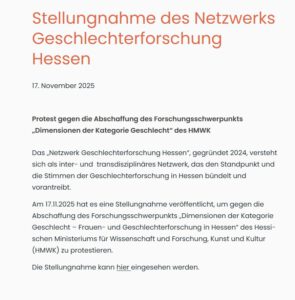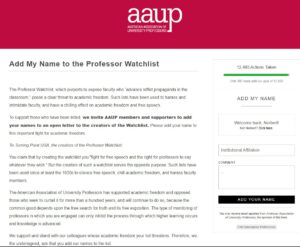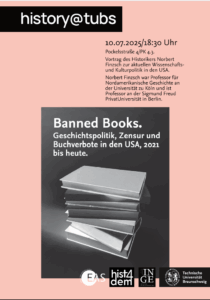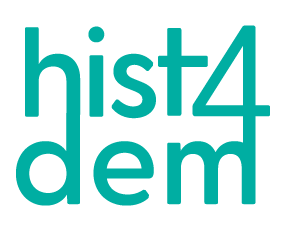-
Protest gegen die Abschaffung des Forschungsschwerpunkts „Dimensionen der Kategorie Geschlecht“
-
hist4dem Aktion zum MLK Day
Martin Luther King Jr. ist eine zentrale Figur der US-amerikanischen Geschichte und das Gesicht des Civil Rights Movement – im Kampf gegen Rassismus, Segregation, Armut und Krieg. Seit 1983 wird er am 3. Montag im Januar mit einem Feiertag geehrt, in diesem Jahr am 19.1. Gleichzeitig wird er von versch. Gruppen vereinnahmt. Wir werden diese
-
Initiative Demokratische Wissenschaft
Zitat von der Webseite der „Initiative Demokratische Wissenschaft“: „‚Wissenschaft für Demokratie – Wir für Dich‘ (WfD) wurde am 23.Mai 2025 in Heidelberg gegründet – als Antwort auf eine wachsende gesellschaftliche Herausforderung: den Verlust von Vertrauen in Wissenschaft und Demokratie. Unser Ziel ist es, Wissenschaft und ihre Erkenntnisse wieder dorthin zu bringen, wo sie hingehören: mitten
-
Leser*innenbrief zu FAZ-Artikel „Wird Klio jetzt konservativ?“
Am 29.08.2025 hatte Jannis Koltermann unter dem Titel „Wird Klio jetzt konservativ?“ einen Text in der FAZ veröffentlicht, über den in unserem Netzwerk rege diskutiert wurde. Den Leserbrief, den die hist4dem-Mitglieder Silke Silke Hensel und Katharina Kreuder-Sonnen verfasst haben, wird die FAZ nicht veröffentlichen. Daher stellen wir ihn hier zur Verfügung.
-
Banned Books: Eine Kooperation der Stadtbücherei Trier mit der Hochschulgruppe der Friedrich-Ebert-Stiftung, der Universität Trier und dem Netzwerk Hist4Dem
Banned Books Trier
-
Widerstand in den USA (Organzation of American Historians)
Academic Freedom as a Practice of Democracy At a panel during the Coalition for Action in Higher Education’s April 2025 national protest, urban and cultural studies scholar Davarian Baldwin made a rousing call for courage in the face of political and material repression in US colleges and universities: “We are the power that we have
-
Guided Tour: „Trailblazers for Change“
Hist4Dem and the Institute of North American History at University of Cologne invite you to join a guided tour of the Stadtarchiv’s exhibition „Trailblazers for Change: The First Women’s Movement in Köln“ on December 11, 2025, from 2:00 to 3:00 pm. The meeting point will be at Eifelwall 5, 50674 Köln (KVB stop “Eifelwall”). Please
-
Akademie der Diözese Rottenburg-Stuttgart: Für eine demokratische Gesellschaft
Historiker:innen gegen Angriffe auf die Freiheit der Wissenschaft https://www.akademie-rs.de//ueber-uns/newsletter-und-social-media/akademie-newsletter-nov-2025
-
Aktionen zum 9. November
Hist4dem veranstaltet eine Reihe von Aktionen zum 9. November, dem Jahrestag mehrerer Schlüsselereignisse der deutschen Geschichte, u.a. eine online stattfindende Diskussionsveranstaltung mit Kirsten Heinsohn, Nadien Rossol, Michael Wildt und Ilko-Sascha Kowalczuk. Mehr Informationen dazu gibt es hier.
-
Banned Books: Geschichtspolitik, Zensur und Buchverbote in den USA, 2021 bis heute
-
CfP: Frauen- und Geschlechtergeschichte in Zeiten der Anfechtung von Demokratie, Diversität und Verantwortung, 9.-11. September 2026
Was geschieht in der Frauen- und Geschlechtergeschichte in diesen politisch herausfordernden Zeiten? Welche Themen und Fragen verdienen unsere Aufmerksamkeit, welche Ansätze und Perspektiven erscheinen besonders fruchtbar? Und wohin geht die Reise? Diese Fragen stehen im Mittelpunkt des Kongresses, der im September 2026 in Bielefeld stattfinden wird. Veranstaltet wird er vom Interdisziplinären Zentrum für Geschlechterforschung der
-
Die „Professor Watchlist“ bedroht die Wissenschaftsfreiheit
Die Professor Watchlist ist eine Website, die von der konservativen Organisation „Turning Point USA“ betrieben wird. Die Website listet akademisches Personal auf, das nach Ansicht von Turning Point „konservative Studenten diskriminiert, antiamerikanische Werte fördert und linke Propaganda im Klassenzimmer verbreitet“. Sie wurde 2016 ins Leben gerufen und hatte bis Dezember desselben Jahres etwa 200 Professoren
-
Vortragsreihe zur kultursensitiven Psychiatrie an der Staatsbibliothek Berlin, 15.10.2925 bis 14.1.2026
Vortragsreihe zur kultursensitiven Psychiatrie Deutschland ist ein Einwanderungsland, auch wenn Einige dies nicht wahrhaben wollen. Menschen aus allen Teilen der Erde leben in Deutschland, von denen viele eine Traumatisierung erfahren haben, weil sie unter beklagenswerten Umständen geflüchtet sind. Gewalterfahrungen vor und während der Flucht waren für sie allgegenwärtig. Unter diesen Geflüchteten befinden sich viele sehr
-
Historikertag 2025
Auf dem 55. Deutschen Historikertag, der vom 16. bis 19. September in Bonn stattfindet, wird das hist4dem-Netzwerk mit einem eigenen Stand vertreten sein. Wir sind an allen Tagen im Arkadenhof anzutreffen. Außerdem werden wir uns am Mittwoch, 17.9., um 18:00 Uhr im Hörsaal 7 zum ersten Mal in Präsenz treffen. Wer Interesse hat, bei hist4dem mitzuwirken,
-
hist4dem beim H-Soz-Kult Podcast „Vergangenheitsformen“
In der neuesten Episode des H-Soz-Kult Podcasts „Vergangenheitsformen“ stellen Astrid Windus, Kerstin Wolff und Jürgen Martschukat im Gespräch mit Claudia Prinz hist4dem vor. Die ganze Folge ist hier zu hören: „Wissenschaft und Demokratie. Ein neues Netzwerk für Historiker:innen“. Daneben ist es auch auf den unterschiedlichen Podcast-Plattformen verfügbar.
-
Seminar „Geschichte der Schwarzen Deutschen: BlPocs von 1600 bis 2024“
Universität zu Köln. Institut für Afrikanistik und Ägyptologie. 2 Semesterwochenstunden Sprache: Deutsch. Max. Teilnehmer: unbeschränkt. Freitags 09:00 – 13:00. Meister Ekkehart-Straße 7. 50923 Köln Seminarraum rechts 2.10/2.11, Termine: 7.11.2025; 21.11.2025; 5.12.2025 und 19.12.2025.
-
Aktionswoche „Zeitalter der demokratischen Revolutionen“, 4.-14. Juli
Die Jahrestage der Declaration of Independence am 4. Juli 1776 und des Sturms auf die Bastille in Paris am 14. Juli 1789 sind uns Anlass, an die demokratischen Revolutionen und Traditionen in Europa und den Amerikas zu erinnern. Elf Tage lang stellen wir zentrale historische Texte vor, die von Idealen und Erfolgen, aber auch Versäumnissen
-
Veranstaltung an der TU Braunschweig zu „Banned Books: Geschichtspolitik, Zensur und Buchverbote in den USA, 2021 bis heute“ am 10. Juli 2025, 18:30 Uhr
-
Statement on Academic Freedom by the NNW
The German Network Sustainable Research (NNW) views with acute concern the escalating threats to academic freedom and institutional autonomy in the United States. These threats are not isolated incidents but part of a systematic, multi-pronged campaign to subordinate higher education to political agendas. They have alarming implications for the future of research and democratic discourse,
-
Vortrag „‚Comeback USA‘: The Language of History in Contemporary America am 1. Juli 2025 an der Uni Leipzig
Der Historiker Olaf Stieglitz, Professor für Amerikanische Kulturgeschichte an der Uni Leipzig, wird am 1. Juli 2025 einen Vortrag zur Geschichtspolitik in den gegenwärtigen USA halten. „Comeback USA“: The Language of History in Contemporary America Olaf Stieglitz, American Studies Leipzig Vortrag im Rahmen der Ringvorlesung ‚Trump 2.0: Cultural Perspectives on the Current US Political Landscape‘
-
Protest der American Historical Association gegen die Entfernung von 381 Büchern aus dem Bestand der Nimitz Library
The American Historical Association has released a statement condemning “the removal of 381 books, including acclaimed historical works and widely used primary sources, from the United States Naval Academy’s Nimitz Library” as well as “what appears to be the expansion of this censorship policy to the full universe of military academies and other education institutions.”
-
Historians on Democracy: A Transatlantic Conversation
Die Max Weber Stiftung, die Universität Bielefeld, the New School und die American Historical Association veranstalten regelmäßig Diskussionsveranstaltungen zur Lage der Demokratie unter Beteiligung deutscher und nordamerikanischer Historiker*innen. Auf der Homepage der Initiative befindet sich ein QR-Code zur Registrierung. https://www.maxweberstiftung.de/en/newsfeed/events/historians-on-democracy.html
-
hist4dem beim Open Ohr Festival 2025 Zitadelle Mainz | 6.–9. Juni 2025
Zitadelle Mainz | 6.–9. Juni 2025 Das politische Jugendfestival Open Ohr steht in diesem Jahr unter dem Motto „Lauter! Demokrat*innen“ – und hist4dem ist mit dabei! Am Samstag, 7. Juni (17:30–19:00 Uhr) diskutiert Astrid Windus von hist4dem auf dem zentralen Podium mit Expert*innen aus Politik, Medien und Wissenschaft. Thema: „Politische Kultur und der Umgang
-
Die American Historical Association klagt gegen die Trump-Regierung

Die American Historical Association, eine der ältesten historischen Fachgesellschaften der Welt, wehrt sich zusammen mit dem Council of Learned Societies und der Modern Language Association gegen die Zerstörung des National Endowment for the Humanities.
-
Statement der Historiker*innen für eine demokratische Gesellschaft (hist4dem) zur neuen Bundesregierung
Die neue Bundesregierung unter Friedrich Merz steht in der Verantwortung, die freiheitlich-demokratische Grundordnung aktiv zu schützen – insbesondere gegenüber rechtsextremistischen Parteien. Die Ministerinnen Karin Prien und Dorothee Bär müssen Bildung und Wissenschaft als Fundament unserer offenen Gesellschaft stärken, gerade auch im Hinblick auf die historisch-politische Bildung und Erinnerungskultur. Wir fordern, dass die Geistes-, Sozial- und
-
Bericht über hist4dem im „Staatsanzeiger“
Der Staatsanzeiger für Baden-Württemberg hat einen kurzen Bericht über unsere Initiative veröffentlicht, der hier nachzulesen ist. In dem Text kommt Sebastian Barsch vom hist4dem-Sprecher*innenteam zu Wort: „Es reicht nicht mehr, nur zu forschen. Wir müssen auch unseren gesellschaftlichen Auftrag wahrnehmen. […] Wir müssen erinnerungskulturell darauf aufmerksam machen, dass Geschichte nicht so einfach passiert, sondern dass
-
Veranstaltungsreihe an der Uni Göttingen
In der Aktionswoche „Demokratie stärken“ und darüber hinaus finden am Seminar für Mittlere und Neuere Geschichte der Uni Göttingen eine Reihe von Veranstaltungen statt. Mehr Informationen und eine Übersicht der Veranstaltungen finden sich hier: Aktionswoche_Demokratie_stärken_SMNG
-
Vortragsreihe an der Uni Erfurt
Im kommenden Sommersemester findet am Historischen Seminar der Universität Erfurt eine Vorlesungsreihe zum Thema „Partizipation und Politische Teilhabe“ statt. Interessierte sind herzlich eingeladen!
-
Aufruf der Organization of American Historians
Dear Members of OAH, Now more than ever, the teaching, study, and presentation of American history is at a tipping point. We understand these are contentious and even frightening times. Yet several members approached us in Chicago at the Annual Conference and asked, “What can I do?” We take heart in the strength and resilience
-
Angriff auf Wissenschaftsfreiheit in den USA
In einer Eskalation der Auseinandersetzung zwischen der Trump-Regierung und der Columbia University blockiere NIH nun die Auszahlung sämtlicher Fördermittel an die Universität, wie ScienceInsider schreibt: „In an 8 April email seen by Science, NIH’s Office of Policy for Extramural Research Administration Director Michelle Bulls told grant administrators that HHS had initially ordered NIH to terminate the first “wave” of grants
-
Historikertag 2025
Hist4dem wird auf dem 55. Historikertag in Bonn vom 16. bis zum 19. September 2025 vertreten sein. Das Thema des Historikertags lautet „Dynamiken der Macht“ und passt sehr gut zu den Zielen von hist4dem. Nähere Informationen folgen in Kürze.
-
Aktionswoche „Demokratie stärken“ (5.–9. Mai 2025)
Zum Gedenktag am 8. Mai setzen wir – die Initiative Historiker*innen für eine demokratische Gesellschaft (hist4dem) – mit einer Aktionswoche ein Zeichen für eine starke und wehrhafte Demokratie. Nähere Informationen finden sich auf der Seite „Aktionen“.
- Protest gegen die Abschaffung des Forschungsschwerpunkts „Dimensionen der Kategorie Geschlecht“

- hist4dem Aktion zum MLK DayMartin Luther King Jr. ist eine zentrale Figur der US-amerikanischen Geschichte und das Gesicht des Civil Rights Movement – im Kampf gegen Rassismus, Segregation, Armut und Krieg. Seit 1983 wird er am 3. Montag im Januar mit einem Feiertag geehrt, in diesem Jahr am 19.1. Gleichzeitig wird er von versch. Gruppen vereinnahmt. Wir werden diese Diskussionenn in Posts auf bsky und instagram vom 9.-20.1. näher einordnen. #hist4demAktion https://www.instagram.com/hist4dem/
- Initiative Demokratische WissenschaftZitat von der Webseite der „Initiative Demokratische Wissenschaft“:
„‚Wissenschaft für Demokratie – Wir für Dich‘ (WfD) wurde am 23.Mai 2025 in Heidelberg gegründet – als Antwort auf eine wachsende gesellschaftliche Herausforderung: den Verlust von Vertrauen in Wissenschaft und Demokratie.
Unser Ziel ist es, Wissenschaft und ihre Erkenntnisse wieder dorthin zu bringen, wo sie hingehören: mitten ins Leben. Wir sind Forschende, Lehrkräfte, Kreative, Studierende, Eltern – Menschen, die nicht länger zuschauen wollen. Als gemeinnütziger Verein stärken wir faktenbasierte Debatten, treten Desinformation entgegen und setzen uns für ein offenes, unabhängiges Wissenschaftssystem ein. Wir verstehen uns als zivilgesellschaftliche Bewegung und Plattform, die engagiert zur Stärkung einer offenen, demokratischen und wissensbasierten Gesellschaft beiträgt.“
Zur Anmeldung: https://zoom.us/meeting/register/rvCpFGX8Qo6sAuXUGCbO3Q Hist4Dem begrüßt die „Initiative Demokratische Wissenschaft“ und weist auf die Gemeinsamkeiten unserer Programmatik hin. Zum Thema „Neutralitätsgebot“ siehe unsere Position unter „Hot Topics“ auf dieser Webseite. - Leser*innenbrief zu FAZ-Artikel „Wird Klio jetzt konservativ?“Am 29.08.2025 hatte Jannis Koltermann unter dem Titel „Wird Klio jetzt konservativ?“ einen Text in der FAZ veröffentlicht, über den in unserem Netzwerk rege diskutiert wurde. Den Leserbrief, den die hist4dem-Mitglieder Silke Silke Hensel und Katharina Kreuder-Sonnen verfasst haben, wird die FAZ nicht veröffentlichen. Daher stellen wir ihn hier zur Verfügung.
- Banned Books: Eine Kooperation der Stadtbücherei Trier mit der Hochschulgruppe der Friedrich-Ebert-Stiftung, der Universität Trier und dem Netzwerk Hist4Dem
- Widerstand in den USA (Organzation of American Historians)
Academic Freedom as a Practice of Democracy
At a panel during the Coalition for Action in Higher Education’s April 2025 national protest, urban and cultural studies scholar Davarian Baldwin made a rousing call for courage in the face of political and material repression in US colleges and universities: “We are the power that we have been waiting for.” Responding to this call, the 2026 volume of the AAUP’s Journal of Academic Freedom seeks to showcase work of students, educators, and activists—and of unions, scholarly associations, and other governance bodies—in fighting back against repression. We invite original scholarly articles grounded in a renewed notion of academic freedom as not only an abstract value or principle to be defended but also a living practice—as historian Joan Scott, among others, has put it—of research, teaching, and public engagement that articulates a democratic higher education and a democratic society. As a practice, academic freedom is embodied in the free, critical inquiry of students and scholars in their areas of expertise; in syllabi, curricula, and classrooms whose content is determined by experts rather than by administrators, boards of trustees, external special interest groups, or government agencies; and in the extramural speech and action of students and scholars, which are protected by the First Amendment and by AAUP principles. As recent court rulings have demonstrated, the practice of academic freedom unambiguously includes inquiry into, teaching about, and extramural speech and action pertaining to Palestine and other controversial topics. However, as experts on academic freedom have meticulously demonstrated, such practice is increasingly being delimited and circumscribed. National and international political discourses and federal investigations have pressured administrators—often all too willing to comply—to police protected speech and action on campuses, while the rise of neoliberal structures of governance at the expense of shared governance has created conditions of institutionalized disposability and precarity that further threaten the freedoms of academic workers. Under such conditions, the practice of academic freedom—resilient, defiant, and unwaveringly committed to the search for knowledge and the common good—itself becomes an instantiation of democracy over and against authoritarianism. To defend and fight for academic freedom is to defend and fight for democracy. With the explicit objective of contributing to this struggle, the new volume seeks submissions on initiatives that have been pursued, strategies that have been deployed, coalitions that have been built, and work that remains to be done in the fight for academic freedom. We will consider any eligible submission relevant to the journal’s core focus on academic freedom. Topics of special interest for the volume include but are not limited to- political education
- public outreach
- sanctuary campuses
- mutual defense compacts and other forms of coalition-building
- debt reveals
- boycott, divestment, and sanctions campaigns
- campus unionization
- protests and other forms of mass mobilization
- lawsuits
- political lobbying
Submissions of 2,000–5,000 words (including any notes and references) are due by March 9, 2026. The complete call for papers, our editorial policy, submission guidelines and instructions, and links to past volumes of the journal are available at https://www.aaup.org/CFP. - Guided Tour: „Trailblazers for Change“Hist4Dem and the Institute of North American History at University of Cologne invite you to join a guided tour of the Stadtarchiv’s exhibition „Trailblazers for Change: The First Women’s Movement in Köln“ on December 11, 2025, from 2:00 to 3:00 pm. The meeting point will be at Eifelwall 5, 50674 Köln (KVB stop “Eifelwall”). Please register by December 9 with Sally Ehlers at s.ehlers@uni-koeln.de. The tour will be in English.

- Akademie der Diözese Rottenburg-Stuttgart: Für eine demokratische GesellschaftHistoriker:innen gegen Angriffe auf die Freiheit der Wissenschaft https://www.akademie-rs.de//ueber-uns/newsletter-und-social-media/akademie-newsletter-nov-2025
- Aktionen zum 9. NovemberHist4dem veranstaltet eine Reihe von Aktionen zum 9. November, dem Jahrestag mehrerer Schlüsselereignisse der deutschen Geschichte, u.a. eine online stattfindende Diskussionsveranstaltung mit Kirsten Heinsohn, Nadien Rossol, Michael Wildt und Ilko-Sascha Kowalczuk. Mehr Informationen dazu gibt es hier.
- Banned Books: Geschichtspolitik, Zensur und Buchverbote in den USA, 2021 bis heute
- CfP: Frauen- und Geschlechtergeschichte in Zeiten der Anfechtung von Demokratie, Diversität und Verantwortung, 9.-11. September 2026Was geschieht in der Frauen- und Geschlechtergeschichte in diesen politisch herausfordernden Zeiten? Welche Themen und Fragen verdienen unsere Aufmerksamkeit, welche Ansätze und Perspektiven erscheinen besonders fruchtbar? Und wohin geht die Reise? Diese Fragen stehen im Mittelpunkt des Kongresses, der im September 2026 in Bielefeld stattfinden wird. Veranstaltet wird er vom Interdisziplinären Zentrum für Geschlechterforschung der Universität Bielefeld (IZG) und vom Arbeitskreis Historische Frauen- und Geschlechterforschung (AKHFG) mit Unterstützung des Fokusbereichs „Contestations of Gender and Democracy“ (ConGeD) der Universität Bielefeld. Alle weitere Informationen sind dem ausführlichen Call for Papers zu entnehmen.
- Die „Professor Watchlist“ bedroht die Wissenschaftsfreiheit

Die Professor Watchlist ist eine Website, die von der konservativen Organisation „Turning Point USA“ betrieben wird. Die Website listet akademisches Personal auf, das nach Ansicht von Turning Point „konservative Studenten diskriminiert, antiamerikanische Werte fördert und linke Propaganda im Klassenzimmer verbreitet“. Sie wurde 2016 ins Leben gerufen und hatte bis Dezember desselben Jahres etwa 200 Professoren aufgelistet. Jetzt gibt es eine Initiative der American Association of University Professors, sich selbst „anzuzeigen“ und so gegen die Liste zu protestieren. Bislang sind mehr als 12.000 Kolleg*innen dieser Aufforderung gefolgt.
- Vortragsreihe zur kultursensitiven Psychiatrie an der Staatsbibliothek Berlin, 15.10.2925 bis 14.1.2026Vortragsreihe zur kultursensitiven Psychiatrie Deutschland ist ein Einwanderungsland, auch wenn Einige dies nicht wahrhaben wollen. Menschen aus allen Teilen der Erde leben in Deutschland, von denen viele eine Traumatisierung erfahren haben, weil sie unter beklagenswerten Umständen geflüchtet sind. Gewalterfahrungen vor und während der Flucht waren für sie allgegenwärtig. Unter diesen Geflüchteten befinden sich viele sehr junge Menschen und auch alleinstehende Kinder. Ihr Status in diesem Lande ist prekär. Ohne Sprachkenntnisse, ohne angemessene schulische Bildung und ohne therapeutische Betreuung sind sie sich selbst überlassen. Wir sind zurzeit nicht in der Lage, ihnen therapeutisch zu helfen, nicht nur, weil der politische Wille dazu fehlt, sondern auch, weil Therapeut:innen mit wenigen Ausnahmen nicht dafür ausgebildet sind, Menschen aus anderen Kulturen angemessen zu betreuen.https://blog.sbb.berlin/ethnopsychiatrie/

- Historikertag 2025Auf dem 55. Deutschen Historikertag, der vom 16. bis 19. September in Bonn stattfindet, wird das hist4dem-Netzwerk mit einem eigenen Stand vertreten sein. Wir sind an allen Tagen im Arkadenhof anzutreffen. Außerdem werden wir uns am Mittwoch, 17.9., um 18:00 Uhr im Hörsaal 7 zum ersten Mal in Präsenz treffen. Wer Interesse hat, bei hist4dem mitzuwirken, ist herzlich willkommen. Weitere Informationen finden sich im Programm des Historikertags.
- hist4dem beim H-Soz-Kult Podcast „Vergangenheitsformen“In der neuesten Episode des H-Soz-Kult Podcasts „Vergangenheitsformen“ stellen Astrid Windus, Kerstin Wolff und Jürgen Martschukat im Gespräch mit Claudia Prinz hist4dem vor. Die ganze Folge ist hier zu hören: „Wissenschaft und Demokratie. Ein neues Netzwerk für Historiker:innen“. Daneben ist es auch auf den unterschiedlichen Podcast-Plattformen verfügbar.
- Seminar „Geschichte der Schwarzen Deutschen: BlPocs von 1600 bis 2024“Universität zu Köln. Institut für Afrikanistik und Ägyptologie. 2 Semesterwochenstunden Sprache: Deutsch. Max. Teilnehmer: unbeschränkt. Freitags 09:00 – 13:00. Meister Ekkehart-Straße 7. 50923 Köln Seminarraum rechts 2.10/2.11, Termine: 7.11.2025; 21.11.2025; 5.12.2025 und 19.12.2025.
- Aktionswoche „Zeitalter der demokratischen Revolutionen“, 4.-14. JuliDie Jahrestage der Declaration of Independence am 4. Juli 1776 und des Sturms auf die Bastille in Paris am 14. Juli 1789 sind uns Anlass, an die demokratischen Revolutionen und Traditionen in Europa und den Amerikas zu erinnern.Elf Tage lang stellen wir zentrale historische Texte vor, die von Idealen und Erfolgen, aber auch Versäumnissen und dem Scheitern der demokratischen Revolutionen erzählen. Diese Quellen neu zu lesen, schärft den Blick auf unsere eigene Gegenwart. Stay tuned!Mehr dazu hier.
- Veranstaltung an der TU Braunschweig zu „Banned Books: Geschichtspolitik, Zensur und Buchverbote in den USA, 2021 bis heute“ am 10. Juli 2025, 18:30 Uhr

- Statement on Academic Freedom by the NNWThe German Network Sustainable Research (NNW) views with acute concern the escalating threats to academic freedom and institutional autonomy in the United States. These threats are not isolated incidents but part of a systematic, multi-pronged campaign to subordinate higher education to political agendas. They have alarming implications for the future of research and democratic discourse, which extend beyond the United States. Over the last months, we have seen that even private institutions of the highest standing are vulnerable to political and financial coercion. Often, the pressures from the outside are reinforced by the responses of university administrations, which act preemptively to avoid further sanctions, eroding academic autonomy from within. Thus, at Columbia University, the Trump administration imposed a series of coercive demands—including the reorganization of disciplinary procedures, the subordination of academic departments to direct presidential oversight, and the revision of curricula — as preconditions for the release of hundreds of millions in frozen research funding. Columbia’s compliance has set a dangerous precedent, demonstrating how financial leverage can be used to dismantle academic self-governance. The university’s adoption of a new definition of antisemitism and the expansion of its Tel Aviv Center, alongside the prohibition of demonstrations and masks on campus, illustrate how political pressure can rapidly alter both policy and academic culture. Harvard University has taken a different path, refusing to capitulate to federal demands and initiating legal action to challenge the administration’s overreach. However, the stakes are high: the government’s threat to revoke Harvard’s tax-exempt status or the efforts to halt international student admission are unprecedented interventions in the workings of a leading research institution. The administration’s demands—to abolish diversity initiatives, review student groups and academic programs, and subject hiring and admissions to external audits—strike at the heart of academic freedom and the principle of shared governance. The chilling effect on free expression and inquiry is already evident, as scholars report self-censorship and a growing climate of fear reminiscent of the McCarthy era. These interventions are not limited to explicit bans or legislative acts. They are enforced through financial threats, administrative overreach, and anticipatory compliance—often before any formal directive is issued. Websites are deleted, job postings rewritten, curricula adjusted, and staff sanctioned, all in response to perceived political pressures. The result is a climate of self-censorship and institutional timidity, where the pursuit of knowledge is increasingly constrained by external agendas. For Germany, recent events highlight growing concerns about academic freedom. Restrictions and pressures are increasingly evident, especially in the humanities and social sciences—fields that engage more often than others with the histories and experiences of minorities and marginalized groups. Such pressures may be reflected in the disinvitation of scholars due to their political profile, in increased scrutiny of research and teaching on sensitive political topics, and in strategic allegations of antisemitism. Universities must remain spaces where difficult questions can be asked and diverse perspectives can be discussed, free from undue political pressure. Although academic freedom is constitutionally protected, it faces challenges from both political and social actors. Additionally, the widespread use of fixed-term contracts and precarious employment conditions in academia as well as the universities’ grant dependency undermine the stability and independence necessary for genuine academic freedom. We therefore call for a robust, collective defense of academic freedom. We declare our solidarity with our colleagues in the United States and elsewhere who are hindered by political interference and control. We urge scholars, students, and the broader academic community (including our colleagues in administration) to actively resist the erosion of academic autonomy and fortify the university as a space for critical inquiry and democratic debate. From the events in the U.S. and other countries, we learn that this requires not only vigilance against external threats but also a critical examination of internal structures that undermine scholarly independence. We commit ourselves to defend the university as a vital node of civil society, where open discourse, critical inquiry, and the pursuit of truth remain non-negotiable. Prof. Dr. Ruth Mayer (on behalf of the Network Sustainable Research/Netzwerk Nachhaltige Wissenschaft)
- Vortrag „‚Comeback USA‘: The Language of History in Contemporary America am 1. Juli 2025 an der Uni LeipzigDer Historiker Olaf Stieglitz, Professor für Amerikanische Kulturgeschichte an der Uni Leipzig, wird am 1. Juli 2025 einen Vortrag zur Geschichtspolitik in den gegenwärtigen USA halten. „Comeback USA“: The Language of History in Contemporary America Olaf Stieglitz, American Studies Leipzig Vortrag im Rahmen der Ringvorlesung ‚Trump 2.0: Cultural Perspectives on the Current US Political Landscape‘ Dienstag, 01. Juli 2025, 17-19 Uhr, Universität Leipzig, Hörsaalgebäude HS 11, Augustusplatz Building on the ongoing prominence of expressions of „greatness“ and the supposed „comeback“ of the United States, this presentation explores the current visibility of „history“ in US culture and analyzes the intensity with which (national) history and memory are being contested today and have been in the recent past. Professor Olaf Stieglitz will examine politically diverse statements, initiatives, and projects, focusing especially on the upcoming anniversary year 2026: what should be remembered when the United States celebrates 250 years of independence next year? The lecture will be held in English.
- Protest der American Historical Association gegen die Entfernung von 381 Büchern aus dem Bestand der Nimitz LibraryThe American Historical Association has released a statement condemning “the removal of 381 books, including acclaimed historical works and widely used primary sources, from the United States Naval Academy’s Nimitz Library” as well as “what appears to be the expansion of this censorship policy to the full universe of military academies and other education institutions.” “Removing books that are based on careful historical research won’t make the facts of our nation’s history go away,” the statement reads. “But it will render the military unprepared to face their legacies and our future.”
- Historians on Democracy: A Transatlantic ConversationDie Max Weber Stiftung, die Universität Bielefeld, the New School und die American Historical Association veranstalten regelmäßig Diskussionsveranstaltungen zur Lage der Demokratie unter Beteiligung deutscher und nordamerikanischer Historiker*innen. Auf der Homepage der Initiative befindet sich ein QR-Code zur Registrierung. https://www.maxweberstiftung.de/en/newsfeed/events/historians-on-democracy.html
- hist4dem beim Open Ohr Festival 2025 Zitadelle Mainz | 6.–9. Juni 2025Zitadelle Mainz | 6.–9. Juni 2025 Das politische Jugendfestival Open Ohr steht in diesem Jahr unter dem Motto „Lauter! Demokrat*innen“ – und hist4dem ist mit dabei! Am Samstag, 7. Juni (17:30–19:00 Uhr) diskutiert Astrid Windus von hist4dem auf dem zentralen Podium mit Expert*innen aus Politik, Medien und Wissenschaft. Thema: „Politische Kultur und der Umgang mit Extremismus“ – wie wir streiten, ohne zu spalten, und wie wir unsere Debattenkultur stärken, ohne Populismus Raum zu geben.
- Die American Historical Association klagt gegen die Trump-RegierungDie American Historical Association, eine der ältesten historischen Fachgesellschaften der Welt, wehrt sich zusammen mit dem Council of Learned Societies und der Modern Language Association gegen die Zerstörung des National Endowment for the Humanities.
- Statement der Historiker*innen für eine demokratische Gesellschaft (hist4dem) zur neuen BundesregierungDie neue Bundesregierung unter Friedrich Merz steht in der Verantwortung, die freiheitlich-demokratische Grundordnung aktiv zu schützen – insbesondere gegenüber rechtsextremistischen Parteien. Die Ministerinnen Karin Prien und Dorothee Bär müssen Bildung und Wissenschaft als Fundament unserer offenen Gesellschaft stärken, gerade auch im Hinblick auf die historisch-politische Bildung und Erinnerungskultur. Wir fordern, dass die Geistes-, Sozial- und Bildungswissenschaften endlich die politische Aufmerksamkeit und finanzielle Unterstützung erhalten, die sie für den Erhalt unserer Demokratie dringend brauchen.
- Bericht über hist4dem im „Staatsanzeiger“Der Staatsanzeiger für Baden-Württemberg hat einen kurzen Bericht über unsere Initiative veröffentlicht, der hier nachzulesen ist. In dem Text kommt Sebastian Barsch vom hist4dem-Sprecher*innenteam zu Wort: „Es reicht nicht mehr, nur zu forschen. Wir müssen auch unseren gesellschaftlichen Auftrag wahrnehmen. […] Wir müssen erinnerungskulturell darauf aufmerksam machen, dass Geschichte nicht so einfach passiert, sondern dass sie gerade in unserer Vergangenheit auch mit Leid, mit Ausgrenzungsideologien verbunden ist. Wir sehen die Gefahr, dass es teilweise wieder in diese Richtung gehen könnte.“
- Veranstaltungsreihe an der Uni GöttingenIn der Aktionswoche „Demokratie stärken“ und darüber hinaus finden am Seminar für Mittlere und Neuere Geschichte der Uni Göttingen eine Reihe von Veranstaltungen statt. Mehr Informationen und eine Übersicht der Veranstaltungen finden sich hier: Aktionswoche_Demokratie_stärken_SMNG
- Vortragsreihe an der Uni ErfurtIm kommenden Sommersemester findet am Historischen Seminar der Universität Erfurt eine Vorlesungsreihe zum Thema „Partizipation und Politische Teilhabe“ statt. Interessierte sind herzlich eingeladen! Mittwochs, 18:00-20:00 Uhr Die Semestereröffnung findet im Forschungsbau C 19.00.02_3 statt. Die weiteren Vorträge finden in der Kleine Synagoge (An der Stadtmünze 5, 99084 Erfurt) statt. 23. April 2025 Forschungsbau Norman Aselmeyer (University of Oxford) „Die Massai sollen Hosen tragen“: Freiwilligkeit, Zwang und politische Teilhabe im postkolonialen Ostafrika Moderation: Iris Schröder 21. Mai 2025 Kleine Synagoge Lorenz Hartung (Universität Erfurt) „Deshalb genießt es wenigstens, dass alle anderen sich vor uns fürchten“. Gewaltbegehren und Selbstwirksamkeit in Zeiten des Rechtsrucks 04. Juni 2025 Kleine Synagoge Alan McPherson (Temple University) The Republican Party and the New Electoral Politics of the Late Cold War Moderation: Lara Rössig 18. Juni 2025 Kleine Synagoge Alexander Obermüller (Universität Erfurt) Politische Teilhabe als Anti-Politik: Konservativer Aktivismus in den Vereinigten Staaten Moderation: Lisa Gersdorf 02. Juli 2025 Kleine Synagoge Simon Goeke (Münchner Stadtmuseum) Migration und soziale Bewegungen. Migrantische Selbstorganisation in West- und Ostdeutschland seit den 1960er JahrenKooperationspartner DFG-FOR 2983 “Freiwilligkeit” www.voluntariness.org Gefördert durch die DFG
- Aufruf der Organization of American Historians
Dear Members of OAH, Now more than ever, the teaching, study, and presentation of American history is at a tipping point. We understand these are contentious and even frightening times. Yet several members approached us in Chicago at the Annual Conference and asked, “What can I do?” We take heart in the strength and resilience of our members and institutions and the urge to defend and advocate for history in the broadest and most unified sense—as a profession, but more importantly as an educational and social necessity in a democratic society. Alongside OAH’s ongoing advocacy, if you are or will be planning to host a panel, a lecture, or an event at your local public library or any other civic institution please share it with us at OAH so that we can amplify your efforts on our social media, and beyond. If feasible, we encourage you to schedule a discussion at your local bookstore or at a friend or colleague’s home, reach out to other local institutions that might sponsor an event, write an op-ed or letter to the editor and send to your local newspapers, reach out to a favorite podcast to suggest the assault on U.S. history as an episode topic, and contact your representatives at all levels of government. Discussing and speaking out on the current crisis caused by the Trump administration’s assault on historians, museums, the National Park Service, the National Archives, the Institute of Museum and Library Services, the National Endowment for the Humanities, the Fulbright program, the Smithsonian, and many other elements inside and outside the federal government that are important to our community of historians, to our locales and states, and to our nation can make a real difference. We encourage you to stay engaged with local efforts in support of higher education and the study of history, to consider participating in events, initiatives or days of action happening on your campus or in your area, and to continue to participate in OAH’s member forums. In addition, we encourage you to share your advocacy on social media and with colleagues in your network, with the hashtag #DefendHistory and #OAH so that OAH can amplify your advocacy and outreach. Thank you for your continued dedication, and for your voice, your action, and your advocacy. On behalf of the OAH Executive Committee, Annette Gordon-Reed, President David Blight, Immediate Past President - Angriff auf Wissenschaftsfreiheit in den USAIn einer Eskalation der Auseinandersetzung zwischen der Trump-Regierung und der Columbia University blockiere NIH nun die Auszahlung sämtlicher Fördermittel an die Universität, wie ScienceInsider schreibt: „In an 8 April email seen by Science, NIH’s Office of Policy for Extramural Research Administration Director Michelle Bulls told grant administrators that HHS had initially ordered NIH to terminate the first “wave” of grants to Columbia and hold others while the school negotiated with the government. Now, she said, no NIH awards can be made to Columbia until the restriction is lifted. In 2024, Columbia received about $690 million in grant funding from NIH.“ Science meldet auch das weitergehende Einfrieren von über die NIH an Columbia University vergebenen Forschungsmitteln, nun im Gesamtumfang von $700 Mio., und schreibt: „Last month, White House began to pressure Columbia over its handling of anti-Israel protests and other allegations of antisemitism at the university, saying it was killing $400 million in federal grants to the school, including the NIH money. NIH terminated approximately 400 grants to Columbia on 12 March and ordered their researchers to stop work on them. Yesterday, NIH raised the stakes: At the behest of its parent agency, the U.S. Department of Health and Human Services (HHS), NIH will not only block new funding for the university, but also stop paying investigators working on all existing NIH projects.” (Aus einer Mitteilung der DFG vom 11.April 2025)
- Historikertag 2025Hist4dem wird auf dem 55. Historikertag in Bonn vom 16. bis zum 19. September 2025 vertreten sein. Das Thema des Historikertags lautet „Dynamiken der Macht“ und passt sehr gut zu den Zielen von hist4dem. Nähere Informationen folgen in Kürze.
- Aktionswoche „Demokratie stärken“ (5.–9. Mai 2025)
Zum Gedenktag am 8. Mai setzen wir – die Initiative Historiker*innen für eine demokratische Gesellschaft (hist4dem) – mit einer Aktionswoche ein Zeichen für eine starke und wehrhafte Demokratie. Nähere Informationen finden sich auf der Seite „Aktionen“.

